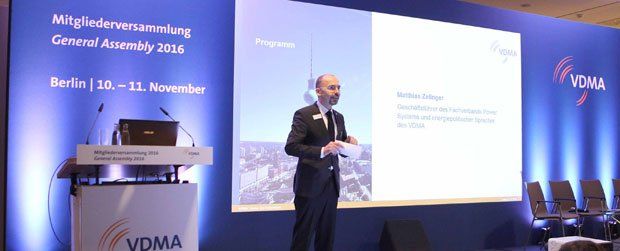Energy
Working group 2

Export energy transition
The Paris Climate Treaty was ratified on 4 November 2016. Politically, this will give a further boost to the export of sustainable energy technologies.
According to Markus Tacke, CEO of Siemens Wind Power & Renewables, the rethinking process among investors worldwide has long since begun: "Energy systems are in a state of upheaval, not only in Germany under the banner of the "energy turnaround," but around the globe. The industry's export figures prove that our technologies are in demand worldwide.
The working group is examining the development of energy technologies in Europe, China and Indonesia. Matthias Zelinger, energy policy spokesman for the VDMA, poses the key question as to whether there is an "energy turnaround dividend" for Germany's initial investments via exports.
Europe shows how different the opportunities can be. The progress made by industry in terms of efficiency is very heterogeneous here and, in the wake of the financial crisis, has generally not been self-evident. According to Rainer Kiechl, CEO of Mitsubishi Hitachi Power Systems Europe GmbH, the market is split in two when it comes to generation: "In Germany and in Western Europe the focus is primarily on technologies that store surplus electricity or make existing plants more flexible. But in the developing countries of Central and Eastern Europe the focus is mainly on highly efficient gas and coal-fired power plants because this is the only way to ensure a reliable and economical supply of electricity there". Due to the geographical structure of the island state and its location, Indonesia benefits in particular from decentralized energy supply solutions and efficiency measures. In China, the market is growing rapidly to bring the energy system up to the state of the art.
"It is important that Germany continues to lead the global energy turnaround."
Thorsten Herdan, Head of Department at the Federal Ministry of Economics
"The example of the photovoltaic supplier industry shows that the competitive pressure with Asian manufacturers is increasing significantly," says Peter Fath, Managing Director of RCT Solutions. Thorsten Herdan, Head of Department in the Federal Ministry of Economics and Technology emphasizes the importance of positioning Germany internationally as a pioneer for a global energy turnaround. "Our international partners are interested in political and technical solutions that have already proven successful in practice. It is important that Germany continues to lead the global transformation of energy systems in the future. We closely involve German companies in our bilateral and multilateral energy initiatives, because we want to offer not only the right political concept but also the technical solutions in the energy sector that are necessary for its implementation.
Export energy transition
Working Group II at the VDMA General Assembly on 11 November 2016 in Berlin will examine the market opportunities for energy technologies in Europe, China and Indonesia.
An exact picture of the German energy system transformation is almost nowhere in sight worldwide. Nevertheless, one thing is certain: The climate conference in Paris in December 2015 will continue to fuel demand for renewable energies and energy-efficient products worldwide. With its innovative solutions, the mechanical and plant engineering sector offers technological answers to the question of how, on the one hand, the globally increasing demand for energy can be satisfied and, on the other, how climate change can be combated.
Because the high export figures of the industry prove that technologies from Germany are in increasing demand worldwide. And the digitalization of the energy world is giving a further boost to an already dynamic industry.
Working Group II "Exporting the energy turnaround" at this year's general meeting of the VDMA is examining the development of energy technologies in the target markets of Europe, China and Indonesia. The aim is to highlight export opportunities for mechanical and plant engineering under different market conditions.
Opportunities after Paris
Matthias Zelinger, energy policy spokesman for the VDMA and Managing Director of the Power Systems Association, and Dr. Markus Tacke, CEO Wind Power & Renewables at Siemens AG, put the results of the Climate Conference in 2015 into perspective and assessed the world market prospects. Afterwards, participants will be able to obtain information on lighthouse projects and get practical tips on how to implement their product strategy in three marketplaces.
Tips based on example markets
Europe is home to most of the established markets and most of the growth markets worldwide. The EU internal market is an example of already heavily regulated markets. Rainer Kiechl, Chairman of the Board of Management at Mitsubishi Hitachi Power Systems Europe GmbH, is ready to provide the impetus.
Indonesia is a good example of a market that is on the threshold of becoming a growth market. Due to its geographical structure and its location, the island state benefits particularly from decentralized energy supply solutions and efficiency measures. Here Regina Brückner, CEO of Brückner Trockentechnik GmbH & Co KG, reports on her experiences with the market.
With China, finally, a typical autocratically regulated market comes into focus, in which there are already several strongly growing markets for renewable energy technologies, while at the same time the energy system has to be brought up to the state of the art. Dr. Peter Fath, Managing Director of RCT Solutions GmbH, gives practical insights into this exciting market. Experts from external organizations are also available.
In the final round, the mechanical engineers will discuss with Matthias Zelinger and Thorsten Herdan, department head in the Federal Ministry of Economics, the question of how politics can flank export activities.
Export energy transition
Germany and the European Union (EU) have set themselves ambitious energy and climate policy goals. These goals can be achieved with modern technologies.
The VDMA therefore fundamentally supports the energy and climate protection goals of the Federal Government and advocates ambitious implementation in Germany.
The central concerns of the capital goods industry at a glance:
Achieving energy and climate policy goals through reliable and market-based instruments.
The further rejuvenation and modernisation of the power plant park must be developed in a transparent manner and be integrated into the further development of the energy system.
Strengthen resource efficiency, but take account of conflicting goals.
Take into account differences between consumer and capital goods.
Increase energy efficiency in buildings, taking into account all building types (residential and non-residential) equally.
Review existing support programmes to increase energy efficiency and increase transparency.
Rapidly extend competitive tendering in the field of energy efficiency to the industrial heating sector.
Do not use separate, national standards for labelling and ecodesign, but develop European regulations and their implementation processes further.




